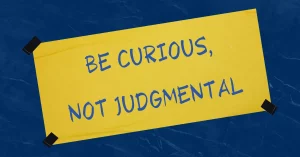
Curiosity: The Antidote to Certainty
Dès qu’on juge sans curiosité (« Ça ne marchera pas », « Il manque de leadership », « Je connais déjà la réponse », etc.),

Because we are living beings, feedback is an inherent condition of life. The fetus begins to react very early in its mother's womb to the gentle voice of its father. They celebrate with pomp when their child poops in the potty. They smile when they see their boyfriend's name on their cell phone screen, teachers grade students in schools, police officers give tickets to critics and arrest criminals, managers conduct annual performance reviews in most organizations. We give and receive feedback daily and in all forms.
Between "radical candor" (being completely transparent) and "devastating empathy" (keeping to oneself what could, very probably, help the other), whether positive, negative, constructive or destructive, etc., feedback aims to express feedback to one's interlocutor on their actions/words and to obtain a modification or reinforcement of said actions/words; I have a reservation concerning this seconde part, I will explain why at the end of the article.
Feedback can trigger emotional reactions in the brain, particularly in regions associated with emotions like the amygdala. Negative feedback can activate areas of the brain linked to stress and anxiety.
Positive feedback has the ability to activate the brain's reward system, releasing neurotransmitters like dopamine, which reinforce behavior, thus motivating us to repeat it.
Feedback, especially constructive feedback, can promote learning by strengthening or modifying neural connections. This can manifest as physiological changes in the brain, associated with brain plasticity.
1. We defend our interests and values by expressing our feedback, so as not to be subject to the decisions of others. Silence means consent, right? Expressing what bothers us allows us to release internal pressure and avoid frustration.
2. In favor of freedom of expression: to free ourselves from the influence, sometimes intimidating, sometimes devastating, exerted on us by certain people or certain circles (like the #metoo movement, among others).
3. It allows us to improve our interaction with others by making ourselves better known to them, to inform them of the type of relationship we wish to maintain and to give them the possibility of deciding whether or not to remain in said relationship, notwithstanding its nature.
In the organizational sphere, giving (and more recently, receiving) feedback is an important component of a leader's role vis-à-vis their colleagues. To maximize the benefits of this inherent practice, here are some suggestions for reflection.
Do you generally know what style of feedback you provide? Are you aware of the impact your feedback style has on others? What generally motivates the feedback you give? What kind of feedback would you like to receive? Why do you want, or not want, feedback? Etc.
Reflecting on this subject, whether individually or with the help of an expert, will allow you to demonstrate sincerity and integrity towards yourself and your colleagues.
Remember that a little self-criticism (e.g., what changes can I make to be more empathetic?) is a worthwhile challenge, without falling into self-flagellation and imposter syndrome.
It is essential to consider certain factors so that your feedback has the desired effect on your interlocutor, while preserving a climate of psychological safety:
a. Hierarchical Dynamics
Even if you possess the highest level of kindness, your colleague may perceive your feedback as a display of authority, simply because you are their superior, and they may be reluctant to discuss or challenge it with you. This reaction is closely linked to their self-esteem and fear of negative consequences for their career. If your feedback doesn't take this factor into account, it can become a barrier to open and honest communication and constructive feedback.
b. Cultural Diversity
"Do not do to others what you would have them do to you." but "do unto others as they would have done unto themselves" takes on its full meaning when giving feedback to a colleague from a different culture. Do your research and examine aspects such as direct vs. indirect, body language, approach to authority, cultural norms, etc.; put things into perspective, while avoiding stereotypes. By adapting your feedback to these diversities, you demonstrate intercultural sensitivity and an inclusive and respectful spirit.
c. Gender Stereotypes
The same feedback is perceived differently by men and women, due to various factors, such as social, cultural, biological, and psychological disparities. Studies show, among other things, the following:
To you gentlemen, I would like to offer you a piece of advice: If you want to give an unsolicited opinion to one of your peers, start by asking them for feedback on your own work. Your feedback will be perceived as support/collaboration rather than an attempt to assert your dominance over them.
d. Generational Diversity
The generational face of teams has changed a lot in recent years. It is common to find four generations interacting within the same team. The older generation is often considered by the younger generation as no longer able to keep up, while the younger generation seems unpleasant, more often than not. The feedback provided by one to the other reflects this perception. It is important to remember, WITHOUT GENERALIZING, that Baby Boomers and Generation X are supporters of the annual performance review. The former introduced it, the latter crowned it and initiated upward feedback (from the employee to their manager). At the other end of the generational spectrum, Millennials and Zoomers grew up with informal and instant feedback (the likes and other reactions on Facebook, Instagram, YouTube, TikTok (more recently), etc.). They have developed emotional resilience and are less “sensitive” to it than their older colleagues.
Focus your feedback on the work, the energy expended, the behaviors, any concrete and measurable element rather than on your feelings that would not help your colleague to progress. Never begin your sentences with: You are wrong!
If you're constantly politically correct, you risk creating passive-aggressive behavior, hypocrisy, or manipulative relationships due to the frustration that builds up. Also, avoid using the sugar-coating technique: don't hide your feedback between two "praises," the employee will likely see through what you're trying to "sugar-coat," and this will have a negative impact on your relationship. Be honest and express yourself openly, taking into account the factors mentioned in the previous section. Constructive feedback is the best way to help someone improve and become more effective.
At the end of your feedback, ask your colleague: "What could I do, or stop doing, to help you?" If you sense discomfort building, don't try to dispel it with small talk. Your willingness to listen demonstrates respect and interest in the other person. You calm the atmosphere, avoid unnecessary confrontations, and create an authentic space for human interaction where your colleague feels safe to express themselves, and why not: confront you.
Listen to the other person's feedback and be open to the small truth in their words. Feedback isn't an absolute truth; it's a point of view, based on facts and testimonies. However, it usually reflects a small part of the truth. If you can't perceive it, question your open-mindedness. "Nobody is perfect" is a scientific truth, in any universe or field.
Feedback will thus become an integral part of work and employees will get used to it and appreciate its benefits:
a. During individual meetings, especially for beginners in the field of feedback (giver and receiver).
b. In team meetings, ask participants to prepare feedback for each other in advance. Preparation will give the giver the opportunity to gauge their words and tone, and since all participants will be recipients at some point, they are reassured. Sharing during meetings leads to constructive discussions, allows everyone to have ideas on how to improve, promotes greater cohesion, and prevents backbiting.
c. Lead by example and take part in 360-degree psychometric tests.
In organizations and elsewhere, feedback is at the heart of our interactions on which we build our relationships, and by extension our lives.
The purpose of feedback is to express feedback to the other person on their actions/words – and I would add – to HOPE to obtain a modification or reinforcement of said actions/words. – et j’ajouterai – ESPÉRER This hoped-for change is not our responsibility. Our responsibility is to be faithful and honest with ourselves and our value system. It is also to hold the mirror up to the other person, as best we can; without forgetting that this mirror is relative to our individual perceptions and values, which may be very different from the perceptions and values of the other person. What the other person does with our feedback is their responsibility.
We are in continuous feedback mode with ourselves. Sometimes fair and enlightened, sometimes unconscious and aggressive, this feedback we give ourselves transforms us, and is sometimes very damaging. Facing my mirror: "I am incompetent, fat, stupid, invincible, too cool, the most beautiful, etc.", I fall into self-flagellation or self-worship. Honesty and kindness, to be able to offer them to others, I must learn to offer them to myself.

Dès qu’on juge sans curiosité (« Ça ne marchera pas », « Il manque de leadership », « Je connais déjà la réponse », etc.),

Here is our top 10 list of reasons (out of 1000) why you should put on your "ugliest sweater" and show up at the party this year.

Here is our top 10 list of reasons (out of 1000) why you should put on your "ugliest sweater" and show up at the party this year.

If your flame feels extinguished and leadership has started to feel heavy, talk about it — with a coach, a mentor, or someone who can help you rekindle it.

Leadership research increasingly emphasizes a key competency: self-awareness. Daniel Goleman, an expert in emotional intelligence, highlights it as…

A handy and flexible tool to make your meetings more dynamic and engaging!
We look forward to hearing from you to learn how we can support you.